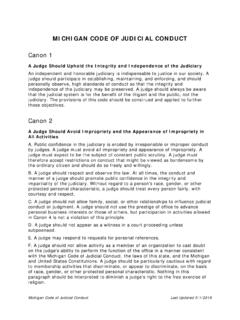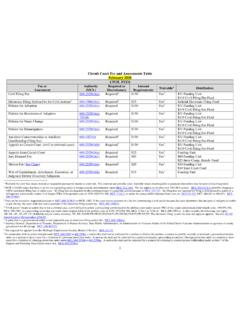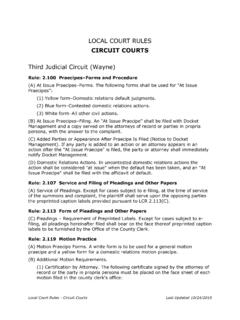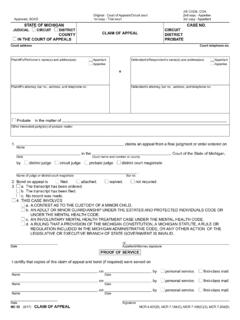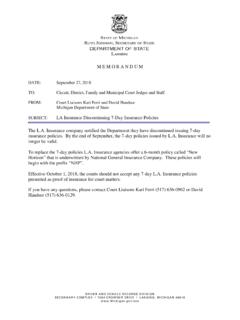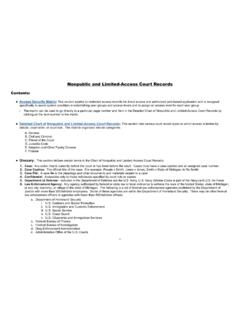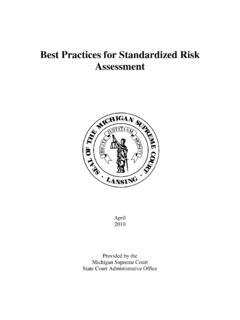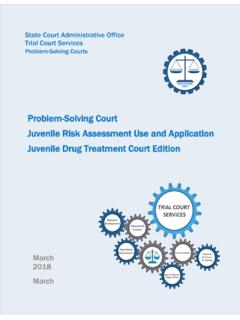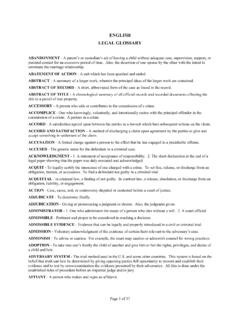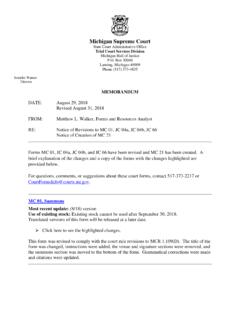Transcription of Michigan Rules Of Evidence
1 Michigan Rules of Evidence Last Updated 1/2/2018 Michigan Rules OF Evidence Rules 101-106 Rule 101 Scope These Rules govern proceedings in the courts of this state to the extent and with the exceptions stated in Rule 1101. A statutory rule of Evidence not in conflict with these Rules or other Rules adopted by the Supreme Court is effective until superseded by rule or decision of the Supreme Court. Rule 102 Purpose These Rules are intended to secure fairness in administration, elimination of unjustifiable expense and delay, and promotion of growth and development of the law of Evidence to the end that the truth may be ascertained and proceedings justly determined. Rule 103 Rulings on Evidence (a) Effect of erroneous ruling. Error may not be predicated upon a ruling which admits or excludes Evidence unless a substantial right of the party is affected, and (1) Objection. In case the ruling is one admitting Evidence , a timely objection or motion to strike appears of record, stating the specific ground of objection, if the specific ground was not apparent from the context; or (2) Offer of proof.
2 In case the ruling is one excluding Evidence , the substance of the Evidence was made known to the court by offer or was apparent from the context within which questions were asked. Once the court makes a definitive ruling on the record admitting or excluding Evidence , either at or before trial, a party need not renew an objection or offer of proof to preserve a claim of error for appeal. (b) Record of offer and ruling. The court may add any other or further statement which shows the character of the Evidence , the form in which it was offered, the objection made, and the ruling thereon. It may direct the making of an offer in question and answer form. (c) Hearing of jury. In jury cases, proceedings shall be conducted, to the extent practicable, so as to prevent inadmissible Evidence from being suggested to the jury by any means, such as making statements or offers of proof or asking questions in the hearing of the jury.
3 (d) Plain error. Nothing in this rule precludes taking notice of plain errors affecting substantial rights although they were not brought to the attention of the court. Michigan Rules of Evidence Last Updated 1/2/2018 Rule 104 Preliminary Questions (a) Questions of admissibility generally. Preliminary questions concerning the qualification of a person to be a witness, the existence of a privilege, or the admissibility of Evidence shall be determined by the court, subject to the provisions of subdivision (b). In making its determination it is not bound by the Rules of Evidence except those with respect to privileges. (b) Relevancy conditioned on fact. When the relevancy of Evidence depends upon the fulfillment of a condition of fact, the court shall admit it upon, or subject to, the introduction of Evidence sufficient to support a finding of the fulfillment of the condition. (c) Hearing of jury. Hearings on the admissibility of confessions shall in all cases be conducted out of the hearing of the jury.
4 Hearings on other preliminary matters shall be so conducted when the interests of justice require, or when an accused is a witness, and so requests. (d) Testimony by accused. The accused does not, by testifying upon a preliminary matter, become subject to cross-examination as to other issues in the case. (e) Weight and credibility. This rule does not limit the right of a party to introduce before the jury Evidence relevant to weight or credibility. Rule 105 Limited Admissibility When Evidence which is admissible as to one party or for one purpose but not admissible as to another party or for another purpose is admitted, the court, upon request , shall restrict the Evidence to its proper scope and instruct the jury accordingly. Rule 106 Remainder of or Related Writings or Recorded Statements When a writing or recorded statement or part thereof is introduced by a party, an adverse party may require the introduction at that time of any other part or any other writing or recorded statement which ought in fairness to be considered contemporaneously with it.
5 Rules 201-202 Rule 201 Judicial Notice of Adjudicative Facts (a) Scope of rule. This rule governs only judicial notice of adjudicative facts, and does not preclude judicial notice of legislative facts. (b) Kinds of facts. A judicially noticed fact must be one not subject to reasonable dispute in that it is either (1) generally known within the territorial jurisdiction of the trial court or (2) capable of accurate and ready determination by resort to sources whose accuracy cannot reasonably be questioned. Michigan Rules of Evidence Last Updated 1/2/2018 (c) When discretionary. A court may take judicial notice, whether requested or not, and may require a party to supply necessary information. (d) Opportunity to be heard. A party is entitled upon timely request to an opportunity to be heard as to the propriety of taking judicial notice and the tenor of the matter noticed. In the absence of prior notification, the request may be made after judicial notice has been taken.
6 (e) Time of taking notice. Judicial notice may be taken at any stage of the proceeding. (f) Instructing jury. In a civil action or proceeding, the court shall instruct the jury to accept as conclusive any fact judicially noticed. In a criminal case, the court shall instruct the jury that it may, but is not required to, accept as conclusive any fact judicially noticed. Rule 202 Judicial Notice of Law (a) When discretionary. A court may take judicial notice without request by a party of (1) the common law, constitutions, and public statutes in force in every state, territory, and jurisdiction of the United States; (2) private acts and resolutions of the Congress of the United States and of the Legislature of Michigan , and ordinances and regulations of governmental subdivisions or agencies of Michigan ; and (3) the laws of foreign countries. (b) When conditionally mandatory. A court shall take judicial notice of each matter specified in paragraph (a) of this rule if a party requests it and (1) furnishes the court sufficient information to enable it properly to comply with the request and (2) has given each adverse party such notice as the court may require to enable the adverse party to prepare to meet the request .
7 Rules 301-302 Rule 301 Presumptions in Civil Actions and Proceedings In all civil actions and proceedings not otherwise provided for by statute or by these Rules , a presumption imposes on the party against whom it is directed the burden of going forward with Evidence to rebut or meet the presumption, but does not shift to such party the burden of proof in the sense of the risk of nonpersuasion, which remains throughout the trial upon the party on whom it was originally cast. Rule 302 Presumptions in Criminal Cases (a) Scope. In criminal cases, presumptions against an accused, recognized at common law or created by statute, including statutory provisions that certain facts are prima facie Evidence of other facts or of guilt, are governed by this rule. (b) Instructing the jury. Whenever the existence of a presumed fact against an accused is submitted to the jury, the court shall instruct the jury that it may, but need not, infer the existence of the presumed fact from the basic facts and that the Michigan Rules of Evidence Last Updated 1/2/2018 prosecution still bears the burden of proof beyond a reasonable doubt of all the elements of the offense.
8 Rules 401-411 Rule 401 Definition of "Relevant Evidence " "Relevant Evidence " means Evidence having any tendency to make the existence of any fact that is of consequence to the determination of the action more probable or less probable than it would be without the Evidence . Rule 402 Relevant Evidence Generally Admissible; Irrelevant Evidence Inadmissible All relevant Evidence is admissible, except as otherwise provided by the Constitution of the United States, the Constitution of the State of Michigan , these Rules , or other Rules adopted by the Supreme Court. Evidence which is not relevant is not admissible. Rule 403 Exclusion of Relevant Evidence on Grounds of Prejudice, Confusion, or Waste of Time Although relevant, Evidence may be excluded if its probative value is substantially outweighed by the danger of unfair prejudice, confusion of the issues, or misleading the jury, or by considerations of undue delay, waste of time, or needless presentation of cumulative Evidence .
9 Rule 404 Character Evidence Not Admissible to Prove Conduct; Exceptions; Other Crimes (a) Character Evidence generally. Evidence of a person's character or a trait of character is not admissible for the purpose of proving action in conformity therewith on a particular occasion, except: (1) Character of accused. Evidence of a pertinent trait of character offered by an accused, or by the prosecution to rebut the same; or if Evidence of a trait of character of the alleged victim of the crime is offered by the accused and admitted under subdivision (a)(2), Evidence of a trait of character for aggression of the accused offered by the prosecution; (2) Character of alleged victim of homicide. When self-defense is an issue in a charge of homicide, Evidence of a trait of character for aggression of the alleged victim of the crime offered by an accused, or Evidence offered by the prosecution to rebut the same, or Evidence of a character trait of peacefulness of the alleged victim offered by the prosecution in a charge of homicide to rebut Evidence that the alleged victim was the first aggressor; (3) Character of alleged victim of sexual conduct crime.
10 In a prosecution for criminal sexual conduct, Evidence of the alleged victim's past sexual conduct with the defendant and Evidence of specific instances of sexual activity showing the source or origin of semen, pregnancy, or disease; Michigan Rules of Evidence Last Updated 1/2/2018 (4) Character of witness. Evidence of the character of a witness, as provided in Rules 607, 608, and 609. (b) Other crimes, wrongs, or acts. (1) Evidence of other crimes, wrongs, or acts is not admissible to prove the character of a person in order to show action in conformity therewith. It may, however, be admissible for other purposes, such as proof of motive, opportunity, intent, preparation, scheme, plan, or system in doing an act, knowledge, identity, or absence of mistake or accident when the same is material, whether such other crimes, wrongs, or acts are contemporaneous with, or prior or subsequent to the conduct at issue in the case.
